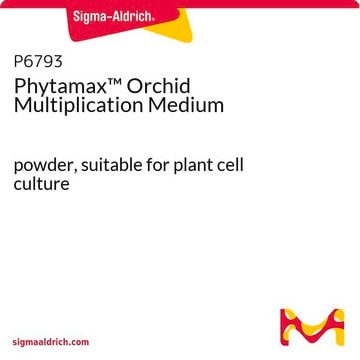M0529
Murashige and Skoog Basal Salt Micronutrient Solution
10 ×, liquid, suitable for plant cell culture
Synonym(s):
Murashige and Skoog Medium, Plant Growth Medium
Sign Into View Organizational & Contract Pricing
All Photos(1)
About This Item
UNSPSC Code:
12352207
NACRES:
NA.72
Recommended Products
sterility
sterile-filtered
form
liquid
concentration
10 ×
technique(s)
cell culture | plant: suitable
application(s)
agriculture
shipped in
ambient
storage temp.
2-8°C
Application
Murashige and Skoog medium is a widely used plant tissue culture growth medium. M&S Basal Medium contains macronutrients that include high levels of nitrate and organic additives such as agar, sugars, vitamins and growth regulators. Important growth regulators frequently added to M&S include IAA (auxin/morphogen) and the Kinetin (cytokinin/cell division promoter).
Formula variant
Preparation Note
Murashige and Skoog medium can be reconstituted from powder or by combining products that are major components of complete M&S medium, such as macronutrient mixtures and vitamin mixtures. Murashige and Skoog Salt mixture (M0529) contain is a 10x concentrate of the micronutrients of the original classic formulation. It can be combined with M&S vitamins or Gamborg′s vitamins and supplemented with sucrose, agar, auxins (IAA) and cytokinins (Kinetin) to generate a complete medium for growth plant tissue culture.
Signal Word
Danger
Hazard Statements
Precautionary Statements
Hazard Classifications
Carc. 1B
Storage Class Code
6.1D - Non-combustible acute toxic Cat.3 / toxic hazardous materials or hazardous materials causing chronic effects
WGK
WGK 2
Flash Point(F)
Not applicable
Flash Point(C)
Not applicable
Certificates of Analysis (COA)
Search for Certificates of Analysis (COA) by entering the products Lot/Batch Number. Lot and Batch Numbers can be found on a product’s label following the words ‘Lot’ or ‘Batch’.
Already Own This Product?
Find documentation for the products that you have recently purchased in the Document Library.
Customers Also Viewed
Yuan Su et al.
The Plant journal : for cell and molecular biology, 94(2), 315-326 (2018-02-14)
Phosphate (Pi) deficiency in soils is a major limiting factor for plant growth. In response to Pi deprivation, one prominent metabolic adaptation in plants is the decrease in membrane phospholipids that consume approximately one-third cellular Pi. The level of two
Liam Walker et al.
The Plant cell, 29(10), 2393-2412 (2017-09-13)
Shaping of root architecture is a quintessential developmental response that involves the concerted action of many different cell types, is highly dynamic, and underpins root plasticity. To determine to what extent the environmental regulation of lateral root development is a
Keiko Midorikawa et al.
Scientific reports, 9(1), 271-271 (2019-01-24)
Non-viral gene carriers have been extensively investigated as alternatives to viral vectors for gene delivery systems into animal and plant cells. A non-viral gene carrier containing a cell-penetrating peptide and a cationic sequence was previously developed for use in intact
Adrian N Dauphinee et al.
Plant physiology, 181(3), 855-866 (2019-09-07)
Autophagy is a major catabolic process in eukaryotes with a key role in homeostasis, programmed cell death, and aging. In plants, autophagy is also known to regulate agronomically important traits such as stress resistance, longevity, vegetative biomass, and seed yield.
Xiao Huang et al.
The Plant cell, 31(12), 2973-2995 (2019-10-17)
Under nutrient and energy-limiting conditions, plants up-regulate sophisticated catabolic pathways such as autophagy to remobilize nutrients and restore energy homeostasis. Autophagic flux is tightly regulated under these circumstances through the AuTophaGy-related1 (ATG1) kinase complex, which relays upstream nutrient and energy
Our team of scientists has experience in all areas of research including Life Science, Material Science, Chemical Synthesis, Chromatography, Analytical and many others.
Contact Technical Service













